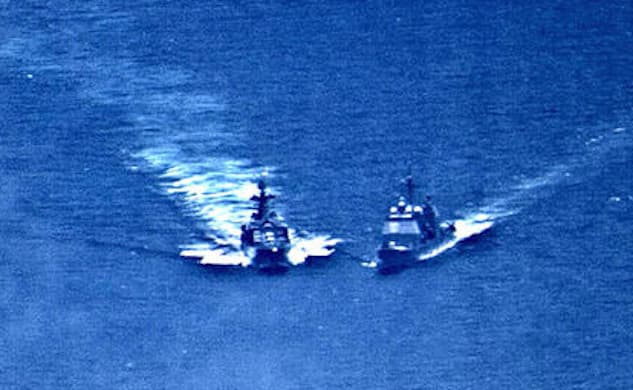Antietam and Chancellorsville Steam Through Taiwan Strait, in Gesture the Communists Call Meaningless
It’s the first time Yankee vessels have entered the strait since Speaker Pelosi made her visit to the Chinese Republic.

SEOUL — American warships are flying the Stars and Stripes again in the Taiwan Strait, and China is responding not with military threats but with derisive words that basically mean nothing.
China showed no signs of bothering two guided-missile cruisers, the United States Ships Antietam and Chancellorsville, as they streamed through the Strait, staying away from the territorial waters of either the Chinese mainland or the waters held by the Free China government on Taiwan.
It’s the first time American Navy vessels have entered the strait since before Speaker Pelosi’s visit to Taiwan in early August, and they’re not making waves other than to provide ammunition for Chinese propagandists.
Those “old warships sailing through Taiwan Straits can’t deter” the People’s Liberation Army, according to a headline in the English-language Global Times, published by the voice of the Chinese Communist Party, the People’s Daily. Rather, the paper said, their presence “only confirms” America’s “hostility toward China’s reunification.”
The Global Times dredged up a suitably critical voice to show what it claims is the weakness of the Americans if push comes to shove in the Strait.
“During wartime, the US warships, whether cruisers, destroyers or even aircraft carriers, can’t survive in the Taiwan Straits if they interfere in the reunification process with force,” a source identified as a “Chinese military expert and TV commentator,” Song Zhongping, was quoted as saying. “They are too close to the mainland and can’t survive the saturation attacks launched by the PLA’s land-based missiles.”
“If the US Navy wants to deter the PLA,” he reassured worried readers, “sailing through the Taiwan Straits is actually pointless and meaningless.”
What’s actually happening is that Communist China, with its show of bravado, is rapidly losing real meaning. Its responses to visits by congressional delegations led by Mrs. Pelosi and Senator Markey, a Massachusetts Democrat, and then by two Republicans, Governor Holcomb of Indiana and Senator Blackburn of Tennessee, were progressively less dramatic. Ms. Blackburn on arrival declared she would “not be bullied by Communist China” while China conducted what it called “normalized military operations.”
Taiwan welcomed the attention. President Tsai Ing-wen and Foreign Minister Joseph Wu happily saw all the American delegations.
Not by accident, Mrs. Blackburn referred to Taiwan as “a country” in defiance of America’s ritualistic adherence to the “one China” myth that holds Taiwan is an off-shore province of China. Ms. Tsai sees no reason to incense Beijing by pushing for nationhood but talked tough in her meetings with the visiting Americans.
Between them, Communist China and Russia are “disrupting and threatening the world order,” she told Ms. Blackburn. In terms of substance, Ms. Blackburn may have accomplished more than the other congressional delegations.
Ms. Tsai thanked her for co-sponsoring the Taiwan Democracy Defense Lend-Lease Act for pumping military supplies into Taiwan, and sought her support for Taiwan joining the Indo-Pacific Economic Framework for Prosperity. Some members of the 14-member grouping, the brainchild of the Biden administration, have blackballed Taiwan for fear of offending the Communist Chinese.
Certainly, the People’s Republic did not seem much concerned by the two American warships testing the waters of the Strait. It was left to a military spokesman to say the troops were “on high alert and ready to foil any provocation at any time” — familiar boilerplate from the Communists.
The Global Times was more specific, implying the Americans were too afraid of Communist China to enter the Taiwan Strait in full force.
“The US side said it will keep the aircraft carrier USS Ronald Reagan to operate in the region,” said the paper, “but the carrier has kept its distance from Taiwan Straits and has been operating in the area close to Japan in previous weeks, which shows that it’s reluctant to put itself in danger for provoking China.”
Billed as “an expert on US studies at the Chinese Academy of Social Sciences,” Lü Xiang had a somewhat different explanation.
“To be honest,” he told the Global Times, “sending warships to sail through the Taiwan Straits following the rules of innocent passage is not even a provocation from a military perspective, it’s just a pointless showcase with a provocative attitude.”
Washington, he said, “is now very carefully calculating the risks and gains.”

